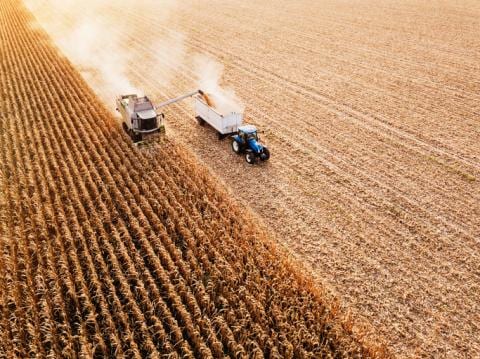Grains markets can be notoriously volatile offering high risk/reward opportunities for traders, with substantial gains and losses being commonplace.

What is the grains market?
The grains trade is the oldest market out there, likely predating recorded civilization by several millennia. For almost as long as we’ve grown grains, we have been trading them and while stocks, forex and hard commodities like gold and oil grab most of the attention these days, grains markets remain of great significance.
Grains future market
Unless they work for a company that processes significant amounts of grain, most traders operate in futures markets, rather than physical ones. Like all futures trading, this effectively involves speculating on what the price of the commodity will be at the time the contract is delivered.
This can be done via a number of exchanges across the globe, including the Sydney Futures Market, Chicago Board of Trade and the London Commodity Exchange. Most of the trading action centres on a handful of widely consumed grains, including: wheat, corn, soybeans, rice, and oats.
There are smaller markets for other types of grains as well, including barley and canola.
Capital requirements of grains
For many traders, one of the advantages of trading in soft commodities like grains is that it can be done for a relatively small capital outlay. Because these are tangible contracts representing actual physical commodities, brokerage firms are willing to lend at a lower margin, allowing for greater financial leverage.
Trading on leverage involves opening up an brokering account and opening up a margin loan. In commodity trading, this allows you to borrow most of the value of the contract, limiting your up-front capital contribution. This will amplify any gains significantly and exacerbate any losses.
Why are grains markets so volatile?
As stated before, grains markets can move sharply and prices can swing significantly from one day to the next, which of course creates opportunities as well as dangers for traders. So what causes these price swings?
- Supply and demand: Commodity prices are, of course, governed by supply in demand, and grains are a global product. A bumper wheat crop in certain parts of the world may push prices down considerably while strong economic growth in a major economy like the eurozone may push prices higher. Or, to go back to our beer example, a decline in beer consumption would push down demand for malted barley. However, if producers responded by pulling out their barley crops and replacing them with an alternative crop, supply would drop and prices may rebound.
- Mother nature: Remember when Cyclone Yasi decimated north Queensland’s banana crop in 2011 and sent prices off the fruit soaring past $15 a kilo? That’s a good example of the havoc mother nature can wreak on commodity markets. While crops like wheat and corn are grown over a broader area, natural disasters like droughts or floods can have a big impact on commodity markets.
- Liquidity: Unlike stocks or forex, or other commodities like gold and oil, grain futures are more thinly traded. With fewer end users in the market and lower volumes it’s much easier for prices to swing rapidly in one direction or another.
Other ways to trade and invest in grains
If futures trading isn’t for you, there are other ways to invest or trade in grain sector, including:
- Grains ETFs: Grains ETFs (exchange traded funds) are a relatively simple way to gain exposure without wading directly into commodities/futures markets. Investors in the space can choose to invest in general agriculture ETFs or can opt for ones focusing on specific grains.
- Grain stocks: Another option is to buy shares in companies that produce or process grains, such as Graincorp (GNC) in Australia or Archer Daniels Midland (ADM) in the US.
- Grains CFDs: Contracts for Difference, or CFDs, are similar to Futures Contracts in that both allow for significant financial leverage, meaning investors borrow most of the money involved in the trade. Unlike Futures, however, a CFD has no set future price or date. Instead, they are a contract to pay or receive the difference in price between when the trader starts the contract and when they decide to finish it. CMC offers CFDs across a range of asset classes, including Forex, stocks and commodities.
Grains market overview
Grains trading is a potentially lucrative, though risky business, with numerous variables at play. Traders interested in delving into the space should do their research and carefully consider the downside risks. Given the complexities at play, many traders choose to focus on only one or two commodities, rather than diversifying across the market.
However, grains just one of a number of options open to commodities traders, including oil, precious metals or coffee, among others. To find out more visit CMC’s Commodities Platform.
CMC Markets Canada Inc. is a member of the Canadian Investment Regulatory Organization (CIRO) and member of the Canadian Investor Protection Fund (CIPF). CFDs are distributed in Canada by CMC Markets Canada Inc. dealer and agent of CMC Markets UK plc. Trading CFDs involve a high degree of risk and investors should be prepared for the risk of losing their entire investment and further amounts. CFD trading is available in jurisdictions in which CMC Markets is registered or exempt from registration, and, in the province of Alberta is available to Accredited Investors only. CMC Markets is an execution only dealer and does not provide investment advice or recommendations regarding the purchase or sale of any CFD. For full details of our fees please refer to our rates schedule. CMC Markets is remunerated through the spread which is the difference between the bid and ask price. Commission and holding costs may also apply.
Apple, iPad, and iPhone are trademarks of Apple Inc., registered in the U.S. and other countries. App Store is a service mark of Apple Inc. Android is a trademark of Google Inc.
This website uses cookies to obtain information about your general internet usage. Removal of cookies may affect the operation of certain parts of this website. For more information about cookies and how to remove them, please read our cookie policy.


